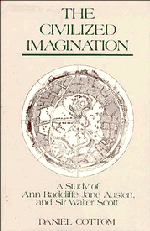Summary
The strong contrast produced by the opposition of ancient manners to those which are gradually subduing them affords the lights and shadows necessary to give effect to a fictitious narrative; and while such a period entitles the author to introduce incidents of a marvellous and improbable character, as arising out of the turbulent independence and ferocity, belonging to old habits of violence, still influencing the manners of a people who had been so lately in a barbarous state; yet, on the other hand, the characters and sentiments of many of the actors may, with the utmost probability, be described with great variety of shading and delineation, which belongs to the newer and more improved period, of which the world has but lately received the light.
– SIR WALTER SCOTT, The Fortunes of NigelIn the foregoing passage as in all of Scott's novels, the reader is promised a certain line of distinction between some version of ancient and of modern times. As it appears in the various novels, this borderline between the old and the new comes to be set in many different periods of historical transition, but it always serves the same narrative function. It might be called the engine of Scott's fiction, this line that allows him to distinguish that which is doomed to recede into history from that which bears the stamp of the future, for it organizes the basic conflicts of his fiction while at that same time serving to predict the resolution of those conflicts.
- Type
- Chapter
- Information
- The Civilized ImaginationA Study of Ann Radcliffe, Jane Austen and Sir Walter Scott, pp. 127 - 147Publisher: Cambridge University PressPrint publication year: 1985



